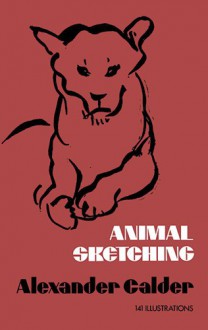Alexander Calder, the renowned sculptor and inventor of mobiles, here brings his characteristic simplicity of line and spirit of movement to the art of animal sketching. The purpose of the book is to help the student to draw animals as he or she sees them. Noting and practicing the way Mr. Calder...
show more
Alexander Calder, the renowned sculptor and inventor of mobiles, here brings his characteristic simplicity of line and spirit of movement to the art of animal sketching. The purpose of the book is to help the student to draw animals as he or she sees them. Noting and practicing the way Mr. Calder captures the emotions and attitudes of animals in a few quick lines, the student can quickly obtain a lasting groundwork in animal sketching that will before long become second nature.These full-body sketches and enlarged details, in rapid, expressive brush-and-ink, of animals from the farm, the zoo, wildlife, and the home, in characteristic poses and movements, reveal both the action and portrait aspects of the art. There are 12 sketches of horses in action (drawing wagon or plough, racing, etc.); 10 drawings of cats, luxuriously asleep or alertly watchful, stretching or crouching; 14 drawings of dogs (many different breeds) in a variety of poses ― lying down, sleeping, sitting, running, sniffing the air, feeding puppies; 11 drawings of lions and other big cats, pacing, lying down, or crouching; 7 sketches of monkeys, jumping and gesticulating; 23 drawings of deer, stooping, sitting, running, etc.; 27 drawings of birds of many different species ― owls sitting, ducks waddling, etc.; and 18 sketches of cows grazing, sitting, swishing tails, and feeding calves. Also included are drawings of seals, elephants, squirrels, kangaroos, and a bear.Because of the simplicity of Mr. Calder's approach to sketching, this book can easily be used by even the youngest of students. There are no difficult techniques to master here, no roundabout methods of construction, but just an insistence on drawing things as the student sees them, with undogmatic (and delightful) assistance from an undisputed master of the simple expressive line. It is unlikely that there is any more pleasant way to study such a fundamental branch of pictorial art.Unabridged and unaltered republication of third (1929) edition.
show less

